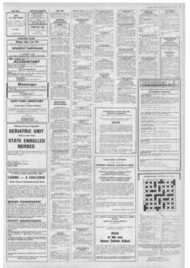Page 3, 23rd November 1973
Page 3

Report an error
Noticed an error on this page?If you've noticed an error in this article please click here to report it.
Tags
Share
Related articles
This Week
Vatican Hopes Polish Talks Will Lead To Concessions
Polish Relations 'easier'
Polish Education Plans
Poland Talks May Lead To Visit By Pope Paul
High hopes over Poland
The Vatican is extremely optimistic over the concrete possibility of re-establishing official Holy See relations with Poland as a result of last week's visit here of Mr. Stefan Olszowski, the Polish Foreign Minister, but is equally cautious over setting a time-table.
Mr. Olszowski spent 50 minutes in audience with Pope Paul, ending with a cordial exchange of gifts in an historic first-ever meeting between a Pope and a post-war Polish statesman.
After the audience Mr. Olszowski then spent 20 minutes talking with Cardinal Jean Villot, Secretary of State, and an extremely long and significant one hour and 20 minutes talking with Archbishop Agostino Casaroli, Secretary of the Coun cil for Public Affairs, who is virtually the Holy See's foreign minister.
Speculation that the Pope would visit. Poland in the near future was categorically dis counted in Vatican circles. But a visit to Poland eventually, possibly during the Holy Year, is not to be excluded since Pope Paul has long nourished the intention of going there.
"The way has been opened but there are still a number of
issues which have to be settled first," one authoritative prelate in the Curia told me.
There was also u complete disclaimer of the possibility that the Holy See and the Polish episcopate could be drawn into disagreement over the terms of any future re-establishment of diplomatic relations and mutual recognition by the Polish Peoples Republic and the lloly See, as was implied by Mr. Olszowski in his post-audience references to a "third party."
The situation between Poland and the Holy See has radically changed since the days when, in l966, Pope Paul was refused permission to fly to Czestochowa for the millennium of Catholicism in that country.
The first concrete step to overcome Polish hostility to the Church in Rome was taken, as referred to by Mr. Olszowski, when Archbishop Casaroli attended the Helsinki Plenary Conference on European Security and Co-operation last June.
Since that meeting there have been behind-the-scenes talks between the episcopate in Warsaw and the government and between Archbishop Casaroli and the Polish Embassy in Rome. It was at these talks that agreement was reached for Mr. Olszowski to have a private and non-official audience with Pope Paul.
Contrary to persistent reports and rumours emanating from "sources close to the Vatioen," Cardinal Stefan Wyszynski, Primate of Poland — who coincidentally celebrated his 25th anniversary as Archbishop Primate of Gneizno the day of Mr.
'Olszowski's visit — has been kept fully informed of every stage of the negotiations.
There are many issues yet to be resolved before ChurchState relations in Poland may be said to he harmonious. Some of these issues may be left in abeyance in the modus vivendI agreement which, as Mr. Olszowski stressed, is to be hammered out as a preliminary to more solid and close diplomatic ties. The Holy See is aiming at the present moment, at achieving a first-step agreement much on the basis of the accord reached with Yugoslavia whereby there was a semi-official diplomatic recognition in the exchange of an -Apostolic Delegate and Special Envoy" from the Holy See to Belgrade and an "Envoy of the Socialist Federated Republic" to the Holy See.
Now that Pope Paul has officially opened the Preparatory Holy Year, the Italian Government has realised that there are likely to he as many pilgrims and tourists in Rome next year as in the Holy Year of 1975 itself.
Signor Mariano Rumor, the Prime Minister, called a plenary cabinet meeting to discuss the implications of what is expected to be the greatest-ever influx of visitors to Italy and how best to welcome them and ensure their well-being and safety,
blog comments powered by Disqus











